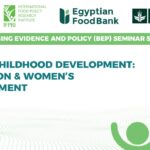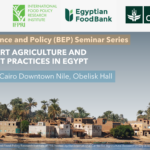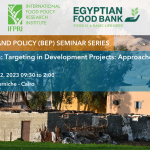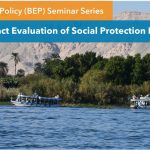The labor force participation rate for women in Egypt fell to 18% in 2023.[1] Among the major factors theorized to contribute to this low rate is women’s time spent on care work. While women’s childcare work is undervalued in national GDP accounting, early childhood is a critical stage in human development that shapes the trajectory for individuals’ health, learning, and overall wellbeing throughout their lives. This seminar will bring together completed and emerging research on drivers of women’s employment and time use on the one hand with research and policy discussion regarding early childhood nutrition, nurseries, breastfeeding, and early childhood education.
BEP Seminar Series: Climate-smart agriculture and development practices in Egypt
Egypt stands at a critical juncture, facing significant environmental stresses exacerbated by climate change, despite being a relatively minor contributor[1] to global greenhouse gas emissions. The nation’s already hot and arid climate is experiencing increasing average temperatures, with projections indicating continued increases. Climate change significantly impacts Egypt’s agricultural sector[2], a vital contributor to the country’s GDP, foreign cash reserves, food security, and employment. Absent adaptation, rising temperatures, increased land salinity due to rising sea levels in the Nile Delta, limited surface water resources and rapid exploitation of groundwater resources will reduce agricultural productivity in the future.
BEP Seminar Series | Roundtable Discussion | Targeting in Development projects: Approaches, challenges, and lessons learned
SFSD, EFB, and IFPRI are excited to announce a forthcoming session as a first the second in the Bridging Evidence and Policy (BEP) Seminar Series. This upcoming session will take the form of a roundtable discussions, gathering experts and development implementers around the theme of “Targeting in Development Projects”. Targeting eligible beneficiaries in governmental and non-profit development programs is a challenging endeavor that requires a deep understanding about the different methodologies, and which is suitable for each program.
BEP Seminar Series LAUNCH EVENT: Impact Evaluation of Social Protection Programs
Event Summary Blog By Sarah Shnouda, Adham Hamdy, and Dalia El Sabbagh Introduction The Middle East and North Africa (MENA) region is witnessing a decline in food security due to the repercussions of the wars in Ukraine, the war in Sudan, the protracted crises in Yemen, and the state of global inflation of food prices, […]




